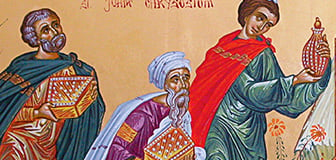Fourth Sunday of Luke
October 16, 2005
Jesus the Sower sows the word of God freely to all people, regardless of the disposition of their hearts. As the seed fails in three different ways in the poorly cultivated soil, it succeeds in the good soil.
The good hearer welcomes the word immediately. The word of God cannot be taken away by Satan, like the seed that falls on the path and is devoured by the birds. The good hearer welcomes the word deeply so that it is not withered by temptation, like the seed that falls among the rocks and does not take root. The good hearer welcomes the word exclusively so that riches, cares and pleasures of life do not strangle it, like the seed that falls among thorns and is choked.
The ground, our heart is the center of our being and our spiritual life. Saint Paul writes: "the word of God is living and powerful…and is a discerner of the thoughts and intents of the heart." (Hebrews 11:12)
The ground on which the seed falls must be moist through frequent and regular watering. St. Paul says: "Neither he who plants is anything, nor he who waters, but God who gives the growth. Now he who plants and he who waters are one, and each will receive his own reward according to his own labor. For we are God's fellow workers; you are God's field…" (! Corinthians 3:7-9) God does the watering through us.
You can become an instrument of God watering all the earth and making it fruitful through your personal commitment to support God's work through your Stewardship pledge. God cannot transform our lives in Christ, our children's, family's and fellow Orthodox Christians, if we have not assisted Him in cultivating and watering their hearts and cultivating good ground.
Good ground creates good souls that are thirsty for truth. Truth quenches thirst with Christ's eternal truth and enduring love. Christians with a cultivated heart of good ground bathe in joy and grow up high towards heaven, bringing forth abundant fruit for themselves and others.
Good people do not keep Christ's word written on paper, for paper is external to man and can be lost. Neither do they only keep it in their minds, for the mind is on the surface of man, and it could be forgotten. But they keep it in their innermost selves, in their hearts, in an honest and good heart, where it will not be lost or forgotten, but will grow and bear fruit.
God sows our hearts with his word, so that his word may multiply in us and in others. Sharing Christ's word is Stewardship. Stewardship means we are custodians, managers of the time, talents and treasures God had given to us. These are possessions, which he allows us to manage for our own welfare and for the spreading of His word.
Stewardship is returning to God a portion of our possessions for the spreading of the Gospel through the ministries of the Church. God loves us and rejoices when he gives to us. We can experience His joy through our giving. We too will get more out of giving than receiving.
We are beginning our Stewardship Campaign for 2006 which distinguishes us as Stewards of God's gifts to us, our money, possessions, family, friends, our world and its resources. The most valuable gift of all is Christ's love for us and generosity to us.
In the parable of the sower, we learn that Christ continues to sow His word, trusting in the outcome. He continues to provide for us, trusting that we will provide for his ministries through the Church.
Kahlil Gibran wrote: "It is well to give when asked, but it is even better to give when unasked."
Mother Theresa tells this story:
"We travel by second-class tram. I was on the tram one day, when a man came up to me and asked "Are your Mother Teresa?" "Yes," I said. He then said, "I have been longing to share in your work but I am very, very poor. Will you allow me to pay your ticket for you?" If I refused, I knew it would hurt him and didn't want to do that. Although I realized that maybe he was giving all he had, it was better than hurting him, so I said "Yes, thank you."
Then he took out a dirty piece of cloth, and there inside was the fare. He gave it to the conductor and paid for my ticket. He was supremely happy, and said: "At last I have been able to share in your work."
Maybe he had to go without food, or walk a long way, but there was the joy of this wonderful man, who wanted to, and did share in this work of love.
You too must decide how important Christ's work means to you and make a sacrificial pledge so that you can also say to the Lord: "At last I am able to share in your work."
Your giving indicates the spiritual cultivation of your heart. Your openhanded stewardship commitment helps Christ the Sower spread his word in our Church and water the seed until it grows upwardly and a hundredfold.
Your generous stewardship pledge for 2006 can and will bear fruit and become a means of witness and service to Christ our Lord and our Church and will resound with the words "at last I am able to share in your work."
† Fr. Alexander G. Leondis
